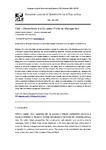Mostrar o rexistro simple do ítem
Path – Dependence and European Fisheries Management
| dc.contributor.author | Martín Palmero, Federico | |
| dc.contributor.author | González-Laxe, Fernando | |
| dc.date.accessioned | 2019-07-10T07:26:38Z | |
| dc.date.available | 2019-07-10T07:26:38Z | |
| dc.date.issued | 2018 | |
| dc.identifier.citation | Martín Palmero, F., & González Laxe, F. (2018). Path – Dependence and European Fisheries Management. European Journal of Government and Economics, 7(2), 138-153. https://doi.org/10.17979/ejge.2018.7.2.4411 | es_ES |
| dc.identifier.issn | 2254-7088 | |
| dc.identifier.uri | http://hdl.handle.net/2183/23472 | |
| dc.description.abstract | [Abstract] For a long time there has been an attempt to explain the current crisis in the fisheries sector in terms of a confrontation between those defending “fish” and those defending “fishermen”. However, the real problem concerns the governance of fisheries and how common resources are assigned; it is not just a crisis of resources per se. Therefore, an insightful understanding of the scenario leading to a satisfactory solution is more complex than it is often believed since there is a need to tackle problems related to the state of stocks, fishermen’s strategies and ecosystems. The fishing sector is not exclusively concerned with production activities as some analysts would have us believe. Rather, it is an area that integrates a number of important features and requires different approaches dealing with the industrial aspects of the sector, distribution and consumption. The fishing sector is characterised by a high level of public intervention, in terms of regulation, finance and state subsidies. The plethora of norms has become such that, currently, the main areas of debate are those concerning how best to preserve resources and ecosystems (by managing and sustaining certain economic levels for example), the welfare of those who make their living from fishing, and the social impact on coastal communities among others. The main focus of debate used to be the conditions of access to fishing and fisheries. Nowadays, however, since early 2000s, efforts have concentrated on the limits of biological safety in order to guarantee sustainable and efficient fishing.This work carries out a dual analysis of the objectives of fisheries management. The first focuses on path dependence and the second on a debate among the three main players and their changing views. This approach allows us to clarify the different interests as regards policy-making, as well as to clearly define the different management implementation. | es_ES |
| dc.description.sponsorship | Ministerio de Economía y Competitividad; CSO2016-78122-R | es_ES |
| dc.language.iso | eng | es_ES |
| dc.publisher | Universidade da Coruña, Servizo de Publicacións | es_ES |
| dc.relation.uri | https://doi.org/10.17979/ejge.2018.7.2.4411 | es_ES |
| dc.rights | Atribución-NoComercial 4.0 España | es_ES |
| dc.rights.uri | http://creativecommons.org/licenses/by-nc/3.0/es/ | * |
| dc.subject | Fisheries management | es_ES |
| dc.subject | Common fishing policy | es_ES |
| dc.subject | Path dependence theory | es_ES |
| dc.title | Path – Dependence and European Fisheries Management | es_ES |
| dc.type | info:eu-repo/semantics/article | es_ES |
| dc.rights.access | info:eu-repo/semantics/openAccess | es_ES |
| UDC.journalTitle | European Journal of Government and Economics | es_ES |
| UDC.volume | 7 | es_ES |
| UDC.issue | 2 | es_ES |
| UDC.startPage | 138 | es_ES |
| UDC.endPage | 153 | es_ES |






